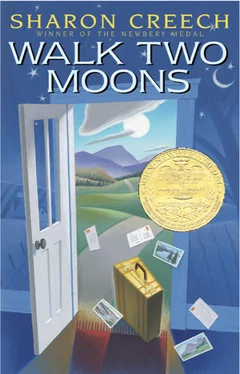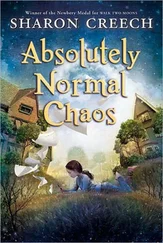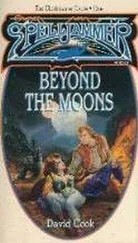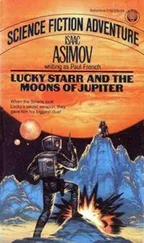“Do you want to know an absolute secret?” Phoebe said. (I did.) “Promise not to tell.” (I promised.) “Maybe I shouldn’t,” she said. “Your father goes over there all the time. He likes her, doesn’t he?” She twirled her finger through her curly hair and let those big blue eyes roam over the ceiling. “Her name is Mrs . Cadaver, right? Have you ever wondered what happened to Mr. Cadaver?”
“I never really thought about—”
“Well, I think I know,” Phoebe said, “and it is awful, purely awful.”
At this point in my story about Phoebe, Gram said, “I knew somebody like Peeby once.”
“ Phoebe, ” I said.
“Yes, that’s right. I knew someone just like Peeby, only her name was Gloria. Gloria lived in the wildest, most pepped-up world—a scary one, but oh!—scads more exciting than my own.”
Gramps said, “Gloria? Is she the one who told you not to marry me? Is she the one who said I would be your ruination?”
“Shoosh,” Gram said. “Gloria was right about that at least.” She elbowed Gramps. “Besides, Gloria only said that because she wanted you for herself.”
“Gol-dang!” Gramps said, pulling into a rest stop along the Ohio Turnpike. “I’m tired.”
I did not want to stop. Rush, rush, rush whispered the wind, the sky, the clouds, the trees. Rush, rush, rush .
If all he wanted to do was take a rest, that seemed a safe enough and quick enough thing for him to do. My grandparents can get into trouble as easily as a fly can land on a watermelon.
Two years ago when they drove to Washington, D.C., they were arrested for stealing the back tires off a senator’s car. “We had two flat, sprunkled tires,” my grandfather explained. “We were only borrowing the senator’s tires. We were going to return them.” In Bybanks, Kentucky, you could do this. You could borrow someone’s back tires and return them later, but you could not do this in Washington, D.C., and you could especially not do this to a senator’s car.
Last year when Gram and Gramps drove to Philadelphia, they were stopped by the police for irresponsible driving. “You were driving on the shoulder,” a policeman told Gramps. Gramps said, “Shoulder? I thought it was an extra lane. That’s a mighty fine shoulder.”
So here we were, just a few hours into our trip out to Lewiston, Idaho, and we were safely stopped in a rest area. Then Gramps noticed a woman leaning over the fender of her car. The woman was peering at her engine and dabbing a white handkerchief at various greasy items inside.
“Excuse me,” Gramps said gallantly. “I believe I see a damsel in some distress,” and off he marched to her rescue.
Gram sat there patting her knees and singing, “Oh meet me, in the tulips, when the tulips do bloooom—”
The woman’s white handkerchief, now spotted with black grease, dangled from her fingertips as she smiled down on the back of Gramps, who had taken her place leaning over the engine.
“Might be the car-bust-er-ator,” he said, “or maybe not.” He tapped a few hoses. “Might be these dang snakes,” he said.
“Oh my,” the woman said. “Snakes? In my engine?”
Gramps waggled a hose. “This here is what I call a snake,” he said.
“Oh, I see,” the woman said. “And you think those—those snakes might be the problem?”
“Maybe so.” Gramps pulled on one and it came loose. “See there?” he said. “It’s off.”
“Well, yes, but you—”
“Dang snakes,” Gramps said, pulling at another one. It came loose. “Lookee there, another one.”
The woman smiled a thin, little, worried smile. “But—”
Two hours later, there was not a single “snake” still attached to anything to which it was supposed to be attached. The “car-bust-erator” lay dismantled on the ground. Various other pieces of the woman’s engine were scattered here and there.
The woman called a mechanic, and once Gramps was satisfied that the mechanic was an honest man who might actually be able to repair her car, we started on our trip again.
“Salamanca,” Gram said, “tell us more about Peeby.”
“Phoebe,” I said. “Phoebe Winterbottom.”
“Yes, that’s right,” Gram said. “Peeby.”
“What was the diabolic thing that happened to Mr. Cadaver?” Gramps asked. “You didn’t tell us that yet.”
I explained that just as Phoebe was going to divulge the purely awful thing that had happened to Mr. Cadaver, her father came home from work and we all sat down to dinner: me, Phoebe, Mr. and Mrs. Winterbottom, and Phoebe’s sister, Prudence.
Phoebe’s parents reminded me a lot of my other grandparents—the Pickfords. Like the Pickfords, Mr. and Mrs. Winterbottom spoke quietly, in short sentences, and sat straight up as they ate their food. They were extremely polite to each other, saying “Yes, Norma,” and “Yes, George,” and “Would you please pass the potatoes, Phoebe?” and “Wouldn’t your guest like another helping?”
They were picky about their food. Everything they ate was what my father would call “side dishes”: potatoes, zucchini, bean salad, and a mystery casserole that I could not identify. They didn’t eat meat, and they didn’t use butter. They were very much concerned with cholesterol.
From what I could gather, Mr. Winterbottom worked in an office, creating road maps. Mrs. Winterbottom baked and cleaned and did laundry and grocery shopping. I had a funny feeling that Mrs. Winterbottom did not actually like all this baking and cleaning and laundry and shopping, and I’m not quite sure why I had that feeling because if you just listened to the words she said, it sounded as if she was Mrs. Supreme Housewife.
For example, at one point Mrs. Winterbottom said, “I believe I’ve made more pies in the past week than I can count.” She said this in a cheery voice, but afterward, in the small silence, when no one commented on her pies, she gave a soft sigh and looked down at her plate. I thought it was odd that she baked all those pies when she seemed so concerned about cholesterol.
A little later, she said, “I couldn’t find exactly that brand of muesli you like so much, George, but I bought something similar.” Mr. Winterbottom kept eating, and again, in that silence, Mrs. Winterbottom sighed and examined her plate.
I was happy for her when she announced that since Phoebe and Prudence were back in school, she thought she would return to work. Apparently, during the school terms she worked part-time at Rocky’s Rubber as a receptionist. When no one commented on her going back to work, she sighed again and poked her potatoes.
A few times, Mrs. Winterbottom called her husband “sweetie pie” and “honey bun.” She said, “Would you like more zucchini, sweetie pie?” and “Did I make enough potatoes, honey bun?”
For some reason that surprised me, those little names she used. She was dressed in a plain brown skirt and white blouse. On her feet were sensible, wide, flat shoes. She did not wear makeup. Even though she had a pleasant, round face and long, curly yellow hair, the main impression I got was that she was used to being plain and ordinary, that she was not supposed to do anything too shocking.
And Mr. Winterbottom was playing the role of Father, with a capital F . He sat at the head of the table with his white shirt cuffs rolled back neatly. He still wore his red-and-blue–striped tie. His expression was serious, his voice was deep, and his words were clear. “Yes, Norma,” he said, deeply and clearly. “No, Norma.” He looked more like fifty-two than thirty-eight, but this was not something I would ever call to his—or Phoebe’s—attention.
Читать дальше












